At the University of Information Technology and Management in Rzeszów, a policy to counteract mobbing, discrimination, and violence against both students and university employees has been in force since the 2019/20 academic year.
As of the 2019/20 academic year, the University of Information Technology and Management, based in Rzeszów, has implemented an Anti-Mobbing, Discrimination and Violence Policy for employees and an Anti-Discrimination and Violence Policy for students and postgraduate students. They define the rules for dealing with the occurrence of mobbing, discrimination, and violence in the academic community and resolving conflicts arising from these phenomena.
A complementary document to the above policies is the Gender Equality Plan adopted by UITM Rector’s Order No. 80/2022 dated November 4, 2022.
The function of the Rector’s Plenipotentiary for Counteracting Mobbing, Discrimination, and Violence is performed by Katarzyna Kurzępa Dedo, Ph.D.
Plenipotentiary’s duties include:
– receiving complaints from students and postgraduate students who, in their opinion, have become victims of discrimination or violence on the part of the student/students, postgraduate student/students, or an employee/employees of the University,
– examining complaints in formal terms and then forwarding them to the Rector who convenes the committee or initiates explanatory proceedings by the Disciplinary Ombudsman for Students of UITM,
– monitoring the phenomena of discrimination and violence against students and postgraduate students at the University and submitting reports in this regard along with recommendations to the Rector,
– conducting educational activities for students and postgraduate students in the field of counteracting discrimination and violence.
Definitions of discrimination, mobbing, violence
Discrimination means the exclusion or worst treatment of someone based on their gender, age, national origin, nationality, religion, belief, skin color, or sexual orientation.
Mobbing means actions or behaviors related to an employee or directed against an employee, consisting of persistent and prolonged harassment or intimidation of an employee, causing him to underestimate his professional suitability, or aimed at humiliating or ridiculing the employee, isolating him or eliminating him from the team of colleagues.
Violence is the intentional act or omission of one person to act against another, which by using the advantage of force violates the rights and personal rights of an individual, causing suffering and harm.
We speak of violence when 4 conditions are met:
- intentional – violence is a deliberate human action and is aimed at controlling and subordinating the victim.
- power imbalance – in a relationship one person has a distinct advantage over the other. She is stronger physically, mentally, materially, professionally, and socially and uses this advantage to force someone to submit to her wishes.
- violation of personal rights and rights – the perpetrator uses his advantage and violates the basic rights of the victim (e.g. the right to physical inviolability, dignity, respect, etc.) – he gives himself the right to offend, hit, criticize, take something or not give it. He does not take into account her needs, protests, and feelings.
- causing suffering and pain – the perpetrator exposes the victim’s health to serious damage and sometimes threatens her life. Experiencing pain and suffering makes the victims less able to defend themselves. The damage can be measurable or not, visible or invisible, immediate or delayed.
What is direct discrimination?
Direct discrimination is a situation in which a natural person is treated less favorably than another person in a comparable situation because of their sex, race, ethnic origin, nationality, religion, religious belief, disability, age, or sexual orientation.
What is indirect discrimination?
Indirect discrimination occurs when an neutral provision/decision/criterion violates the rights of a person or group, e.g. due to sex, religion, disability, etc. to the legitimate aim to be achieved and the means of achieving that aim are appropriate and necessary.
What behaviors are not discriminatory?
These are behaviors in which students feel disadvantaged, in particular by a university employee (e.g. in the context of passing credits, setting deadlines, applicable material), but this behavior is not caused, inter alia, by their gender, race, or nationality. Such situations do not constitute discrimination.
What is the Anti-Discrimination and Violence Policy for students and postgraduate students?
Acts of discrimination and violence against students and postgraduate students constitute a violation of generally applicable laws and internal regulations in force at the University.
You can read the description of the procedure here.
What is student violence?
Violence includes acts of physical, verbal, psychological, and sexual aggression, as well as cyberbullying (online violence), harassment, blackmail, and other forms of violence.
How should a student report violence or discrimination?
A student who believes that he has been a victim of discrimination or violence by another student or University employee may submit a complaint to the representative in writing or electronically. The Rector’s representative for counteracting mobbing, discrimination, and violence at UITM is Katarzyna Kurzępa Dedo, Ph.D.
What should the complaint contain?
The complaint should include:
- the date;
- description of the facts of the case;
- indication of exactly which actions or behaviors of another student or university employee are (in the opinion of the student submitting the complaint) a manifestation of discrimination or violence;
- indication of the name and surname of the person or persons who, in the student’s opinion, are the perpetrators of discrimination or violence;
- justification and indication of evidence that the discrimination or violence has occurred or is still taking place;
- signature of the student submitting the complaint.
The plenipotentiary examines the complaint in formal terms and then forwards it to the Rector who convenes the committee. The burden of proving that the accusations are false rests with the person identified as the perpetrator of discrimination or violence.
Contact to the plenipotentiary: pelnomocnikmdp@wsiz.edu.pl
An employee may be discriminated against in terms of:
- establishing and terminating an employment relationship,
- employment conditions,
- promotion,
- access to training to improve to improveprofessional qualifications, for all or a significant number of employees, unless the provision, criterion, or action is objectively justified due to the lawful purpose to be achieved and the means to achieve this purpose are appropriate and necessary.
How should an employee report mobbing, violence, or discrimination?
An employee who believes that he has been a victim of mobbing, discrimination, or violence by another student or University employee may submit a complaint to the representative in writing or electronically. The Rector’s representative for counteracting mobbing, discrimination, and violence at UITM is Katarzyna Kurzępa Dedo, Ph.D.
What should the complaint contain?
The complaint should include:
- the date;
- description of the facts of the case;
- indication of exactly which actions or behaviors of another student or university employee are (in the opinion of the employee submitting the complaint) a manifestation of discrimination or violence;
- indication of the name and surname of the person or persons who, in the employee’s opinion, are the perpetrators of discrimination or violence;
- justification and indication of evidence that the discrimination or violence has occurred or is still taking place;
- signature of the employee submitting the complaint.
The plenipotentiary examines the complaint in formal terms and then forwards it to the Rector who convenes the committee. The burden of proving that the accusations are false rests with the person identified as the perpetrator of discrimination or violence.
Contact to the plenipotentiary: pelnomocnikmdp@wsiz.edu.pl

February 2025
The female face of science – International Day of Women and Girls in Science
On the occasion of the International Day of Women and Girls in Science, celebrated on the 11th of February, we would like to highlight the interesting scientific achievements of women from the University of Information Technology and Management in Rzeszów.

January 2025
Report for the year 2024
Report on the 2024 implementation of the university’s Gender Equality Plan for 2022-2025 aimed at creating spaces of safety and equality by the Rzeszów-based School of Information Technology and Management.
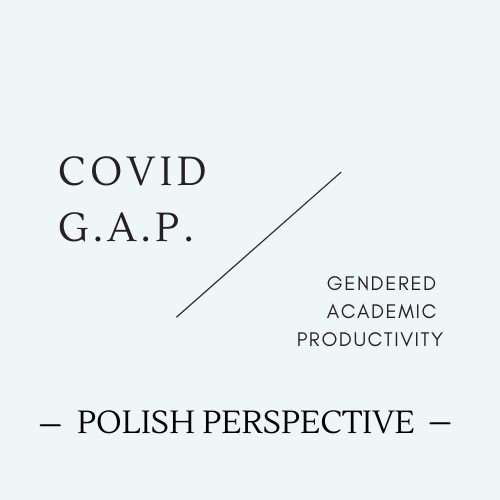
December 2024
Popular-science seminar presenting the results of the Covid G.A.P. Polish perspective/ Poland’s perspective project (16.12.2024).
The project involved qualitative research related to the scientific work of male and female researchers during the pandemic crisis and the possibility of its long-term impact on scientific development in the context of gender differences. The main research issue concerns the determinants of academic productivity during the pandemic crisis, including variables such as social roles, family situation, and stage of academic career development.
Speakers: Iwona Leonowicz-Bukała PhD, Dr Olga Kurek-Ochmańska PhD, Dr Monika Struck-Peregończyk PhD.
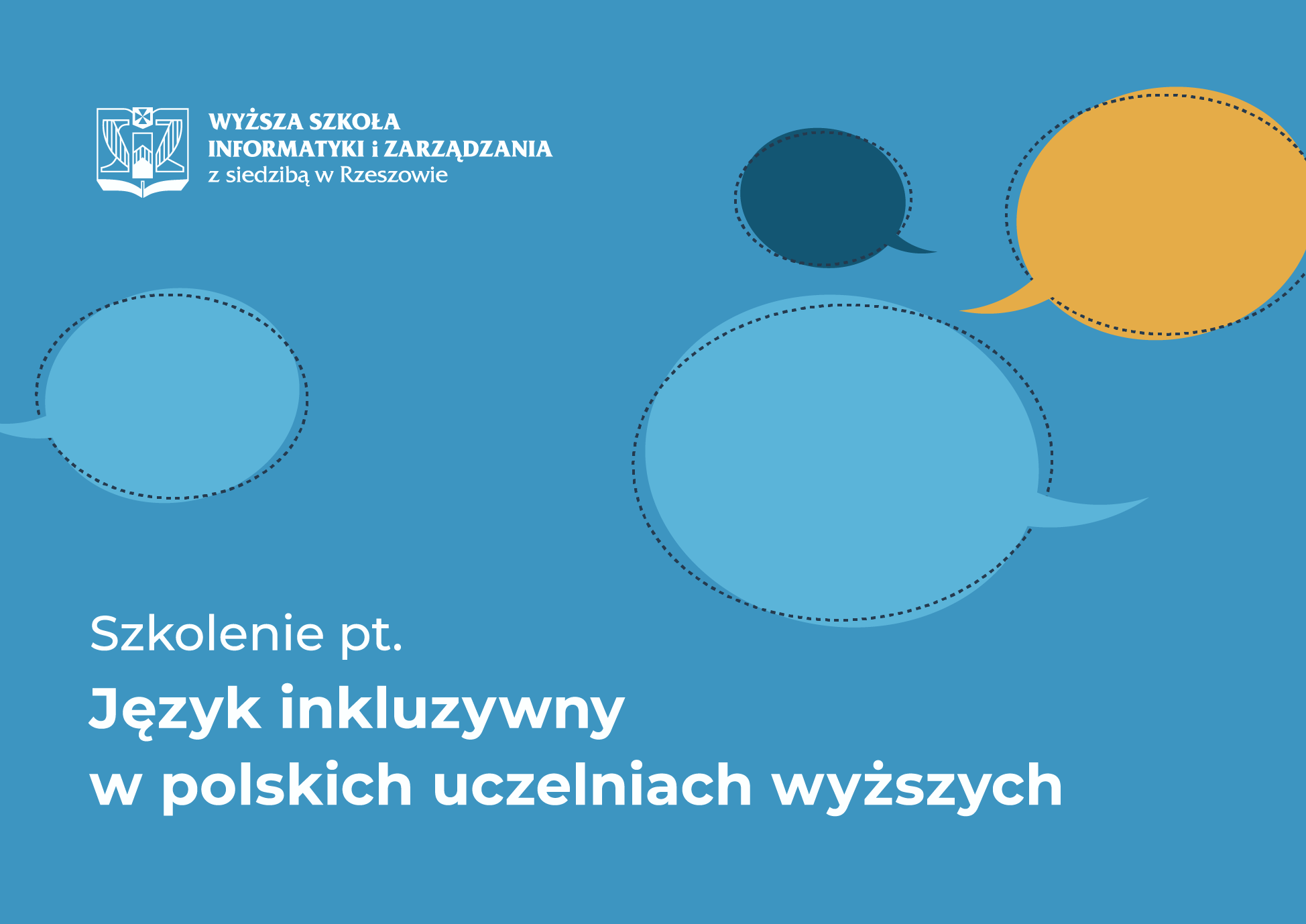
December 2024
Inclusive language in Polish universities
Training entitled „Inclusive language in Polish universities” (3.12.2024) for UITM staff and employees, conducted by Jan Gałkowski, PhD.
The training covered the following thematic areas: inclusive language in the practice of universities in Poland, inclusive language in business dealings with students and staff at universities, specific issues (e.g. accommodating the needs of people with disabilities, LGBT+ people, neurodiverse people and others), planning for change at universities in terms of inclusive language.
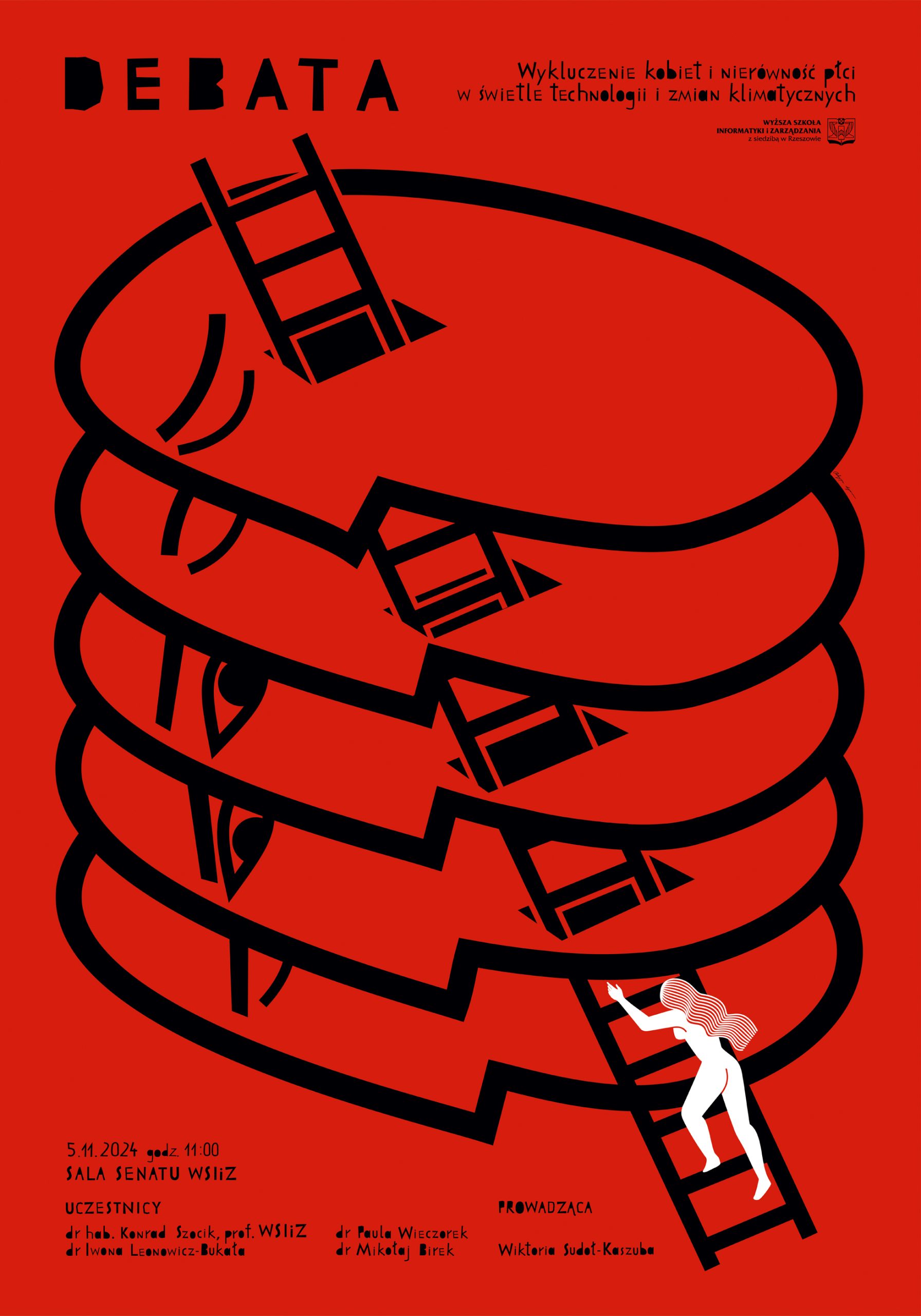
November 2024
Women’s exclusion and gender inequality in the light of technology and climate change
A debate with the participation of UITM scientists entitled „Women’s exclusion and gender inequality in the light of technology and climate change” (5.11.2024), which addressed the problems of exclusion and discrimination, not only of women, but also of people with disabilities and the elderly.
The starting point for the discussion was the presentation of a book by Prof. UITM Konrad Szocik, entitled ‘Feminist Bioethics. ‘Feminist Bioethics in Space. Gender Inequality in Space Exploration’ published by Oxford University Press in 2024.
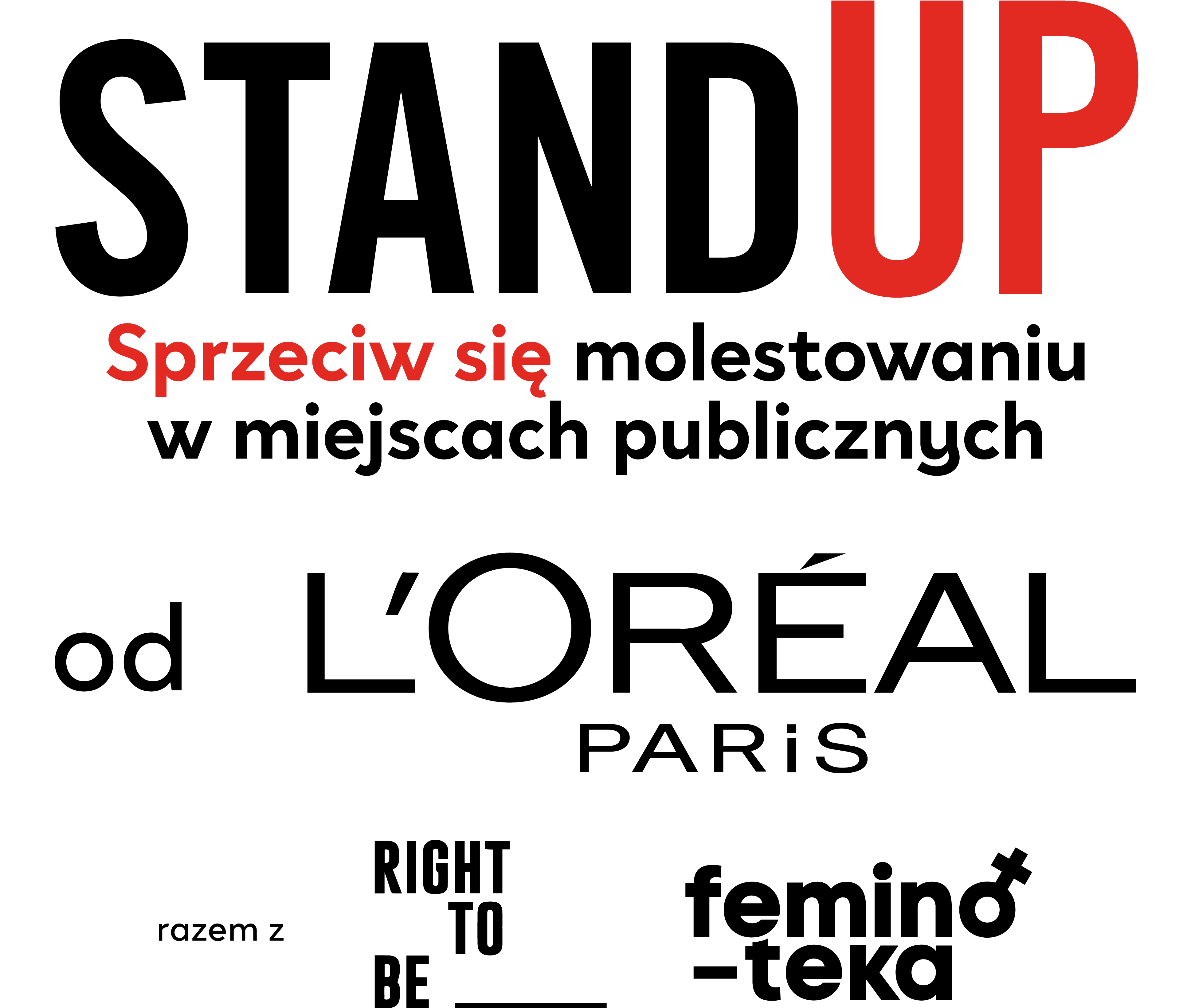
October-November 2024
Stand Up. Opposing harassment in public places
Online training courses entitled “Stand Up. Opposing harassment in public places” for male and female students of English and Polish-language paths (10 .10, 26.11, 27.11.2024).
The trainers from the Feminoteka Foundation: “(…) teach how to react when we experience harassment, but also how not to remain a helpless witness/helpless witness of such a situation and take care of our own safety and that of the person experiencing harassment. 5D is a set of simple tools: deconcertify, include others, document, come to the voice and give support after, which are available to practically every person. With this method, we emphasise that harassment is not condoned and show trainees that they have options at their fingertips to make their community safer.”
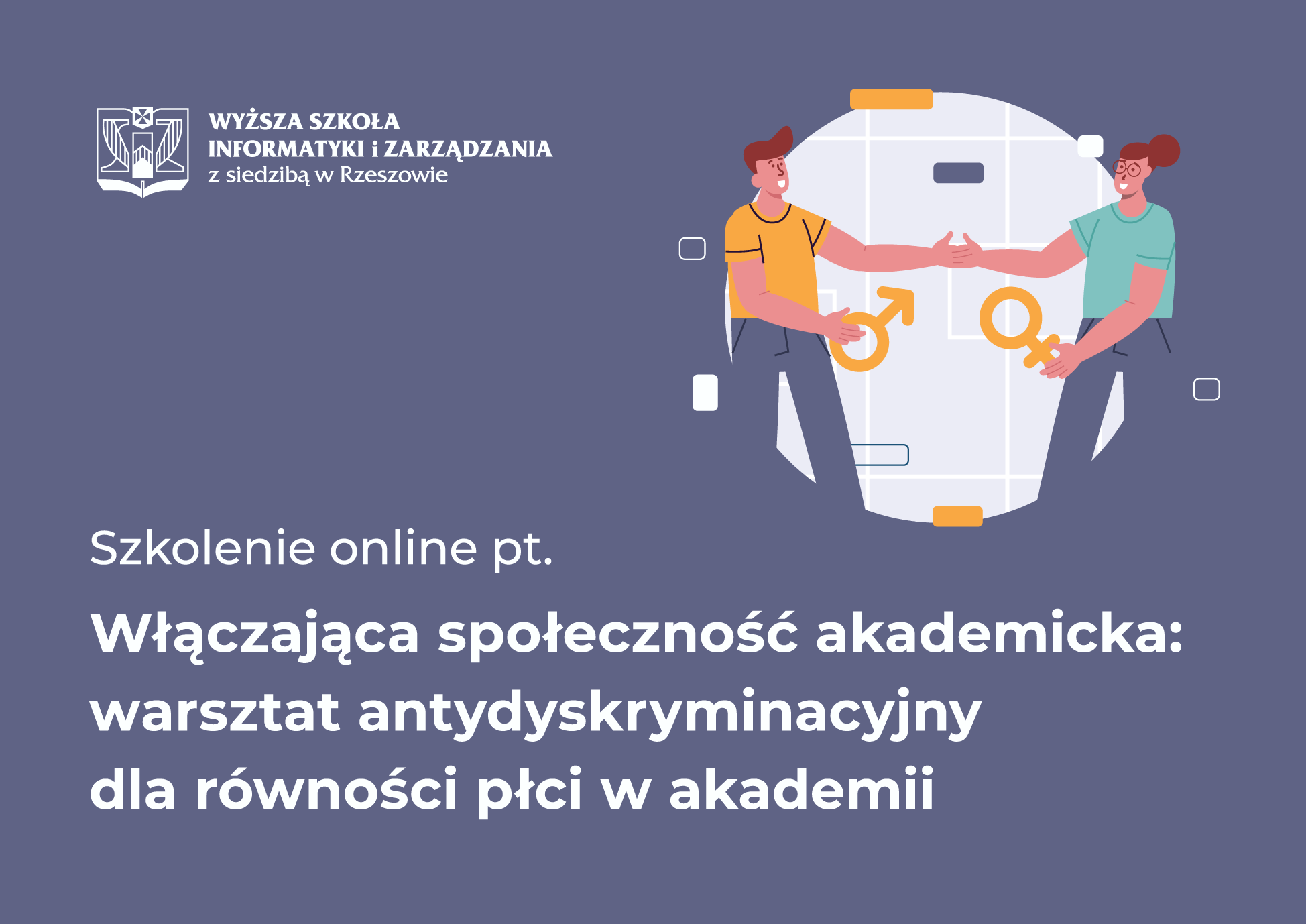
June 2024
Training on inclusive academic community
On June 14 and June 17, 2024, an online training course entitled „Inclusive academic community: an anti-discrimination workshop for gender equality in the academy” addressed to research and teaching and administrative staff, led by Iwona Leonowicz-Bukała, PhD.
The aim of the training was to raise the awareness of its participants about the problems of discrimination in academia, mainly in the context of gender equality, but also discrimination based on race, ethnicity, nationality, age religion or health status. The workshop, while strengthening soft skills, was also a natural continuation of the training on the legal aspects of countering bullying, discrimination and violence.
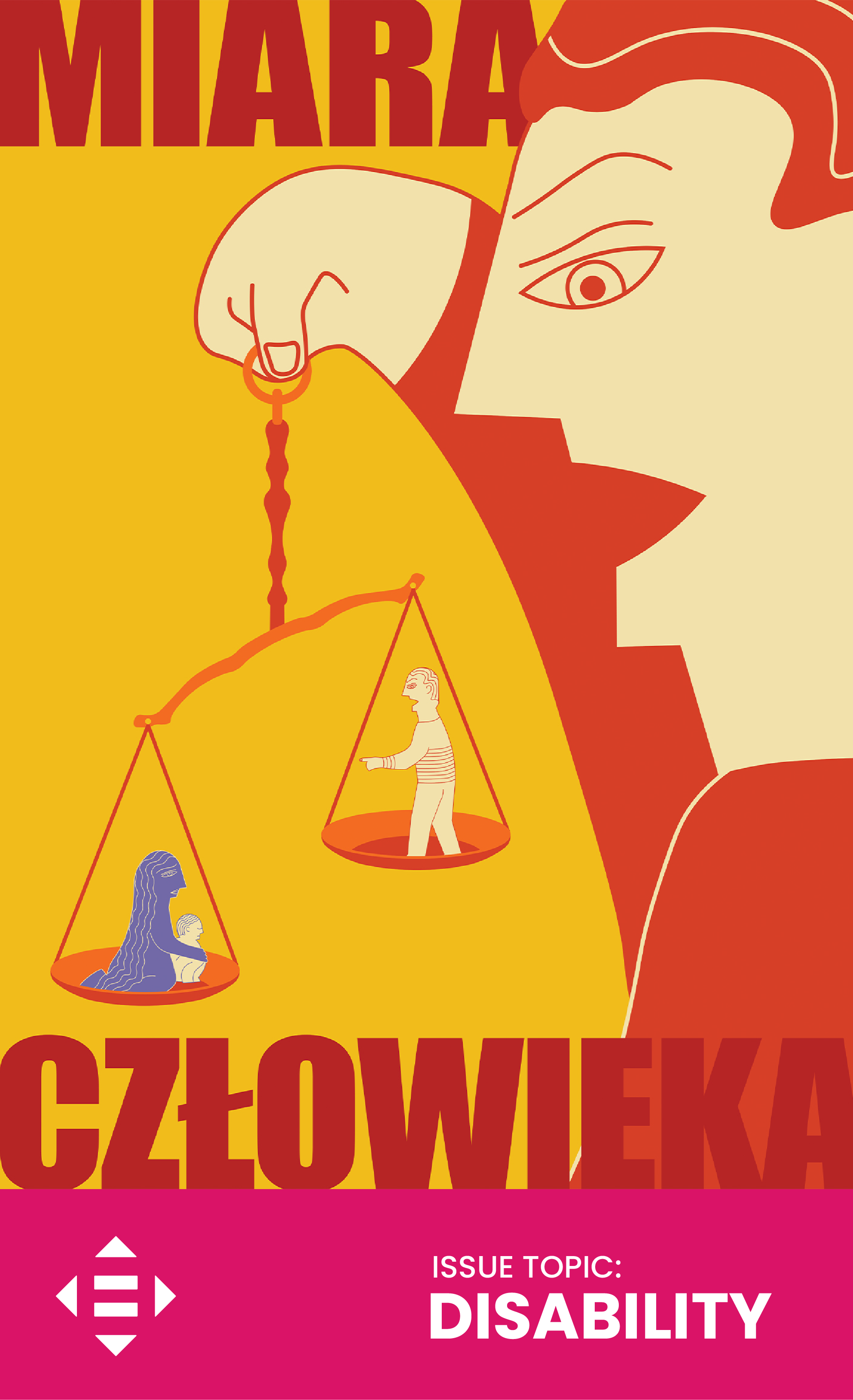
May 2024
Disability – UITM Office of Sustainable Development newsletter
The topic of the May newsletter of the Office of Sustainable Development is disability. Goal No. 10 of the 17 Sustainable Development Goals is devoted to the demand that the needs of disadvantaged and marginalized groups should be taken into account in policies aimed at reducing inequality. The specific tasks included in the 2030 Agenda for Sustainable Development include promoting and strengthening the social, economic and political inclusion of all people by 2030, regardless of age, gender, disability, race, ethnicity, nationality, religion, economic or other status.
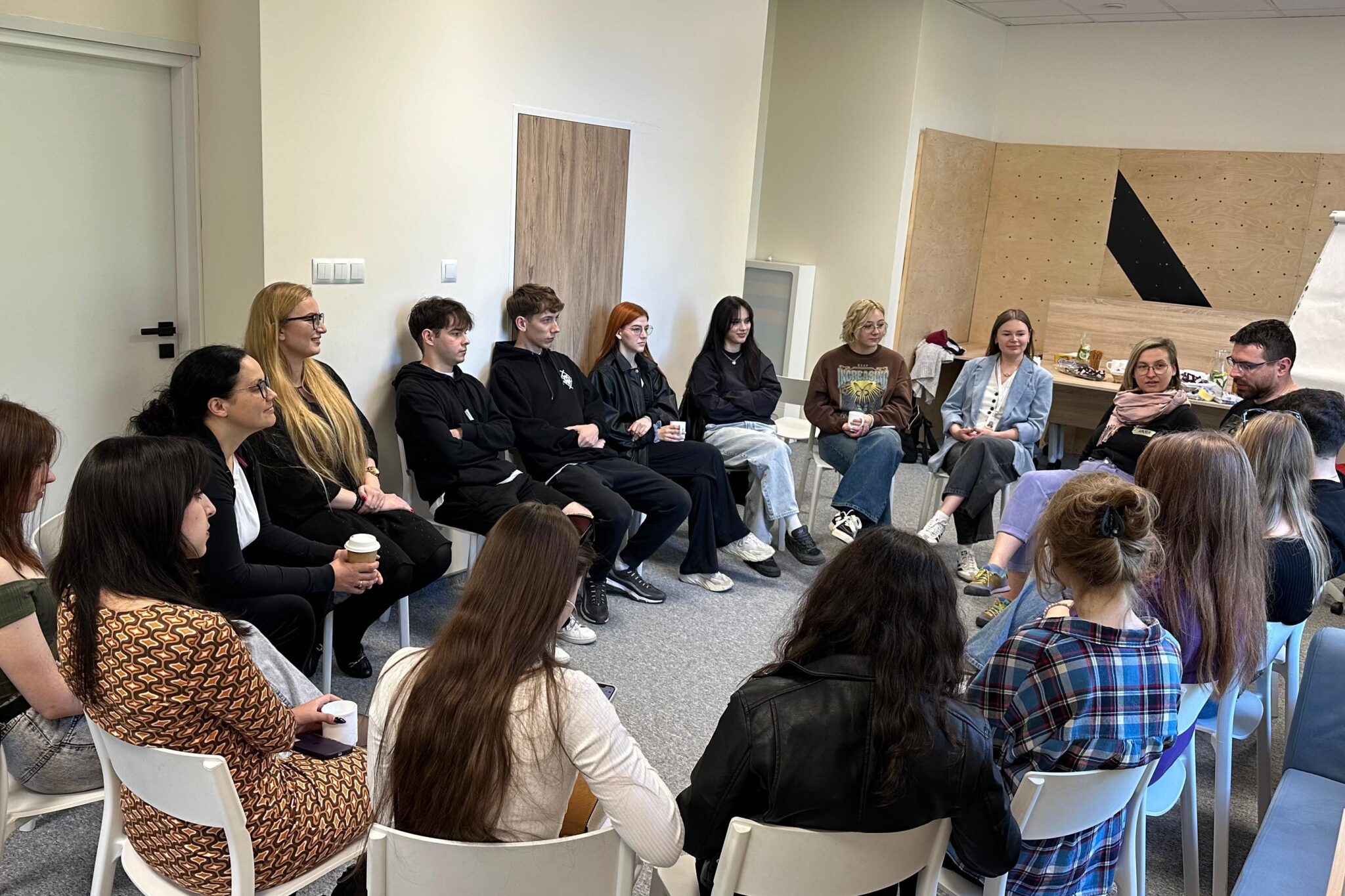
May 2024
“Let’s get to know each other” anti-discrimination workshop
Philology students together with UITM lecturers Iwona Leonowicz-Bukała, PhD and Paula Wieczorek, PhD took part in anti-discrimination workshops. They were organized by the Ukrainian House in cooperation with the Podkarpackie Association for Active Families (PSAR) at the TUTU Centre.
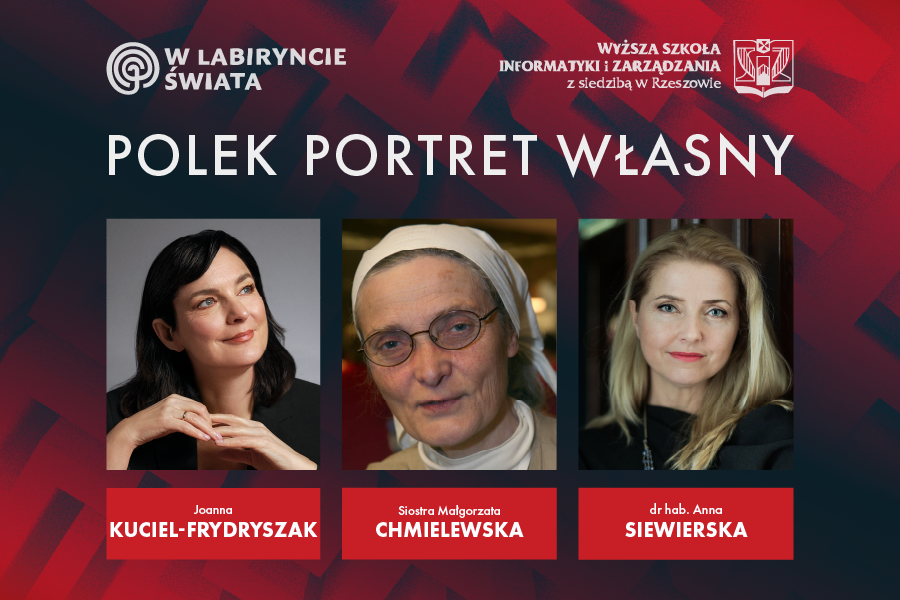
April 2024
What do Polish women need today and why are femininities important?
Panel discussion entitled “What do Polish women need today and why are femininities important?” organised by the University of Information Technology and Management in Rzeszów in cooperation with “Tygodnik Powszechny” as part of the series entitled “In the labyrinth of the world” (25.04.2024).
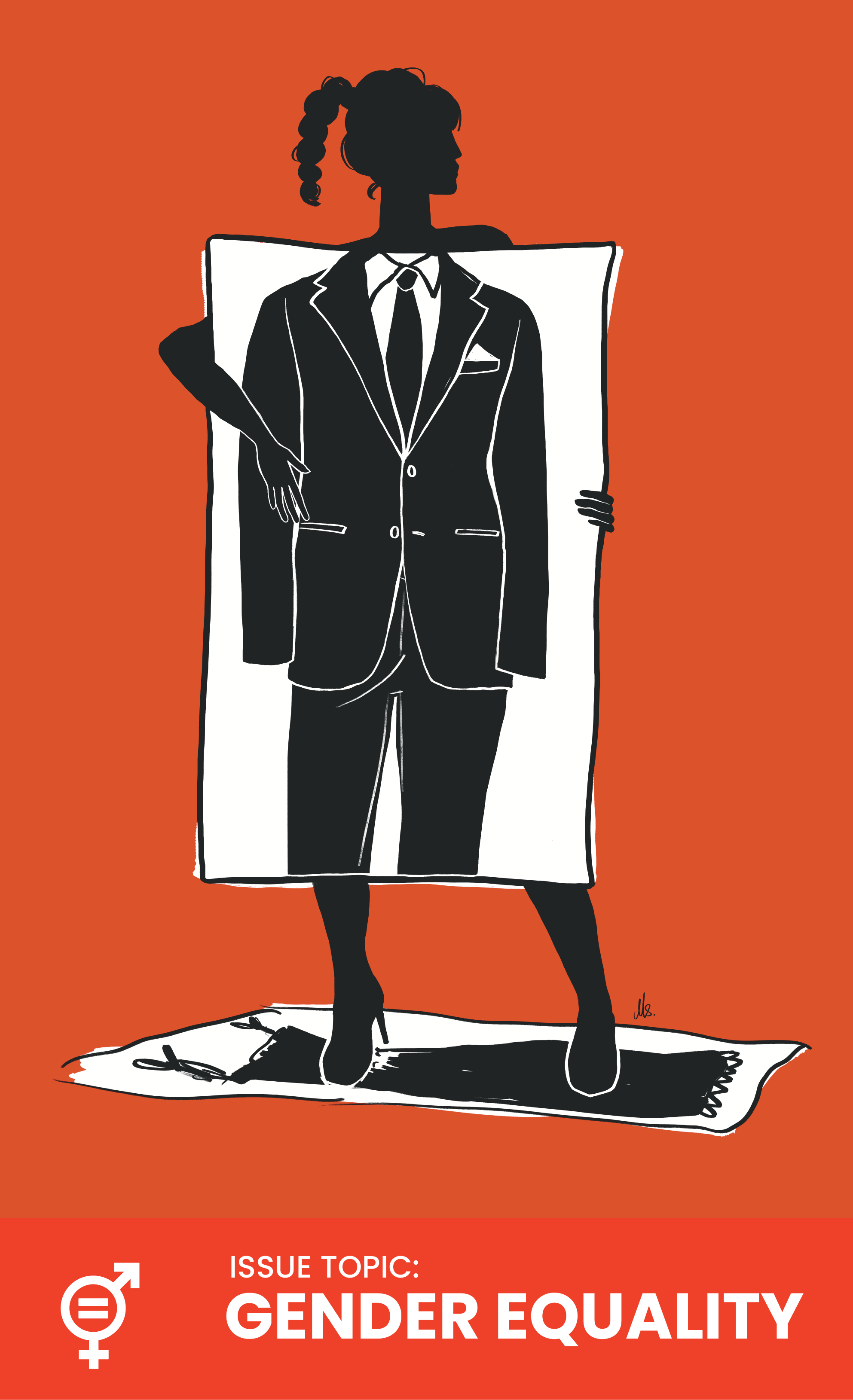
March 2024
Equality – newsletter of the UITM Office of Sustainable Development
The topic of the March newsletter of the Office of Sustainable Development is Goal #5 of the 17 Sustainable Development Goals: Achieve gender equality and empower women and girls.
“Gender equality is not only a universal human right, it is also the foundation of a sustainable world in which people will live in peace and prosperity. Ensuring that women and girls have equal access to education, health care and decent work, and to participate in political and economic decision-making will strengthen sustainable economies and benefit societies and humanity as a whole. “*
*Objective5: Achieve gender equality and empower women and girls

February 2024
We need to believe in ourselves more
An interview on International Women in Science Day entitled ‘We need to believe in ourselves more’ with female UITM scientists on the topic of scientific work from a woman’s point of view.

Report on the 2023 implementation of the university’s Gender Equality Plan for 2022-2025 aimed at creating spaces of safety and equality by the Rzeszów-based School of Information Technology and Management.

December 2023
UITM Students know that every gender is equal
In a resounding display of commitment to equality, students at the University of Information Technology and Management recently engaged in a compelling debate titled „Every Gender is Equal.” The event, held at the IQ Student Club on December 12, 2023, was a noteworthy part of this year’s celebration of Human Rights Day. Dr. Zdzisław Rapacki, economist and former Permanent Representative of the Republic of Poland to the UN office in Geneva from 2004 – 2010 was the honorary guest.
Dr. Rapacki delivered an enlightening keynote titled „The role of international organizations in shaping standards and monitoring compliance with human rights.
In addition to Dr. Rapacki, the debate was attended by Małgorzata Wejsis-Gołębiak, a lecturer at the Department of Political Science and Administration at UITM, and students of Management: Mieczysław Moneta, supervisor of the Intercultural Research Club „The Globe” science club, and Valeriia Krasnozhon.
An important element of the event was the summary of this year’s Amnesty International Letter Writing Marathon. The debate was also accompanied by an exhibition of posters „EVERYONE HAS EQUAL RIGHTS REGARDLESS OF GENDER”/”ALL PEOPLE HAVE RIGHTS REGARDLESS OF GENDER”, which was the originator and organizer of the Council of Scientific Clubs of UITM in cooperation with KN The Globe, the exhibition consisted of 16 works by students major in Computer Graphics.
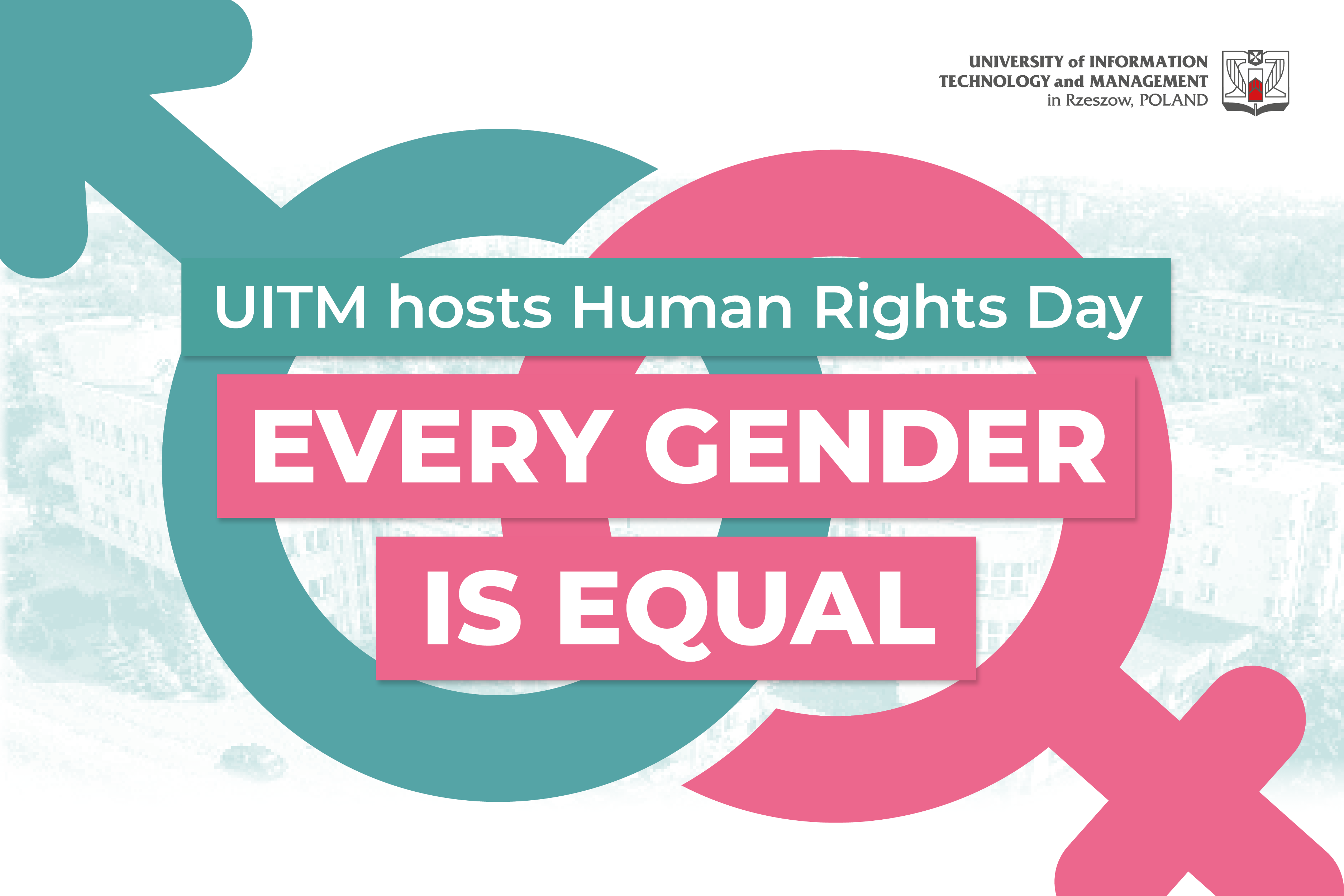
December 2023
We invite you to the debate „Równość płci/every gender is equal”
The event will take place on December 12, 2023 at 9:30 am at the IQ Student Club of the University of Information Technology and Management in Rzeszow. The debate will be held in English with simultaneous translation into Polish. The debate will provide insight into how students from different cultural backgrounds perceive gender equality issues, introduce the range of anti-discrimination solutions used around the world and the activities of international organizations. The event’s guest of honor will be Dr. Zdzislaw Rapacki, economist and long-time diplomat, Permanent Representative of the Republic of Poland to the UN Office at Geneva in 2004-2010.

October 2023
UITM joins the Academic Safety and Equality Network (ASBiR)
Membership in the Academic Safety and Equality Network (ASBiR) allows you to participate on an ongoing basis in events organized by affiliated universities and related to activities or plans of institutional solutions in the area of security and equality in the academic environment.

May 2023
Training on counteracting mobbing, discrimination, and violence
The training took place on May 26 and June 14, 2023, led by Andrzej Kiebała, Ph.D. During the training, the following topics were discussed: the issue of equality in employment, the types and effects of discrimination and mobbing, the employee’s rights in the event of discrimination and mobbing, the employer’s obligations in terms of preventing and combating discrimination and mobbing, as well as the liability of the employer and other persons (supervisors and other employees) for discrimination and mobbing.

November 2022
UITM Gender Equality Plan
The Gender Equality Plan aims to create a space of safety and equality conducive to the harmonious development of all members of the academic community, which consists of research and teaching staff, lecturers, administrative staff, and students.

October 2020
An Anti-Mobbing, Discrimination, and Violence Policy for employees and an Anti-Discrimination and Violence Policy for students
UITM has implemented this policy from the 2020/21 academic year. The first Rector’s Plenipotentiary for counteracting mobbing, discrimination, and violence was Konrad Szocik, Ph.D., and currently, the Plenipotentiary is Katarzyna Kurzępa-Dedo, Ph.D. Violence, mobbing, and discrimination are three phenomena that cannot be tolerated, especially in the academic environment. Each employee/student who has suffered discrimination, mobbing, or violence should report the matter to the Rector’s Plenipotentiary for counteracting mobbing, discrimination, and violence.
The HR Excellence in Research certificate awarded by the European Commission confirms that a given unit is characterized by a friendly research work environment and implements transparent principles of recruitment of research workers.
Maintaining this prestigious distinction by the University required and requires taking many initiatives to shape and improve the instruments of recruitment, employment, and employee evaluation. The first report on the implementation of The Human Resources Strategy for Researchers – HRS4R at the University of Information Technology and Management was submitted in 2019 and received a positive assessment from European Commission experts (…) – says the Vice-Rector for Science and International Cooperation, Dr. Hab. Agata JURKOWSKA-GOMUŁKA, prof. UITM.




